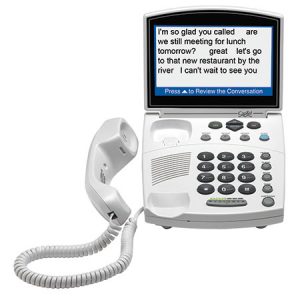
Hearing loss can make phone calls more frustrating than friendly.
Do you or your loved one have difficulty hearing others? The National Institute on Deafness and Other Communication Disorders, or NIDCD, reports that older adults are at an increased risk for some type of hearing loss. While the organization reports that only 2% of adults ages 45-54 have some type of disabling hearing loss, that number jumps to 8.5% for adults over the age of 55. While hearing loss is on a spectrum, even the smallest loss can lead to a litany of complications, including the inability to connect to others. Fortunately, caption phones for seniors are offering a reliable way to stay in the conversation.
Hearing Loss Challenges
For many older adults, hearing impairment of any kind is a new condition that arrives with age. While some older adults have lived with hearing loss for their entire life, the majority of seniors will find themselves coping with this new loss later in life and without a lifetime of experience or tools to use.
For older adults living with hearing loss, the ramifications go well beyond needing to ask others to repeat themselves. Those living with hearing loss, no matter how severe, can find themselves feeling lonely or isolated as well as feeling depressed because they are left out of the conversation. Seniors with hearing loss are also at a higher risk of being incorrectly diagnosed with cognitive decline, as they do not always understand verbal direction.
Fortunately, there are tools and devices that are designed for older adults to better hear what is happening around them. These devices go beyond hearing aids and offer new ways for adults to stay connected to those they love.
Caption Phones for Seniors
Caption phones are an excellent way for older adults living with hearing loss to stay connected with their friends and family members. Traditionally, landline phones and even smartphones are not the most friendly for those living with hearing impairment. Background noises on the speaker’s end as well as on the listener’s end of the conversation can make it very difficult to keep up with the phone call. Caption phones take the guesswork out of the equation.
Generally speaking, caption phones operate like traditional landline phones. However, there is a large screen with easy-to-read words that allow the person who has hearing loss to read what the caller is saying. Captions are provided on the screen in real time, making it easy for the person with hearing loss to stay in the conversation without major delays or pauses in the dialogue.
It’s a simple idea that goes far for seniors who are looking to maintain their independence and quality of life, as well as keep that connection to those they love.
Most caption phone technology requires an internet connection in addition to the phone line. But other than that, there are few adjustments that need to happen in the senior’s home in order for the caption phone to begin working.
Getting a Caption Phone

Caption phones come in a variety of styles, allowing you to choose which works best for you. Image credit: CapTel
As a consumer, you have a variety of options when it comes to caption phones. This is great because it means you can find a phone that works best for your lifestyle and your budget. It is important to note that anyone can purchase a caption phone; however, if you would like to receive a free caption phone and services, you can apply by having your audiologist complete a certification that states you have hearing loss, and a caption phone would be required in order for you to communicate over the phone.
You have a choice when it comes to the company you select for your caption phone and services. Companies such as CapTel, ClearCaptions, CaptionCall, and CapTel from T-Mobile are a few of the most readily available caption phone providers. Some providers even offer services for mobile devices, meaning you can better communicate while on the go.
Making Your Choice
When choosing a caption phone and service provider, it is important to consider a few things. First, ensure that you can adjust the size of the font of the words on the screen so that you can read it without straining. Vision difficulties also increase with age, so you want to be sure you have the option to increase or decrease the font size to meet your needs now and in the future.
You can also observe if the caption phone meets your style preferences. While there aren’t too many choices, you should still have a choice when it comes to what your new caption phone looks like.
Finally, check to be sure you understand how to operate the phone. Practice makes perfect, but the phone shouldn’t be too overly complicated for you to use successfully on the first try.
You should also inquire about the installation process to ensure it will be relatively easy. Many providers offer installation so that you won’t have to worry about setting up the service and connecting it to the internet. If the provider doesn’t offer installation, they should offer installation support so that if you have any questions while setting it up in your home, you can easily reach someone to answer them.
Caption phones are wonderful adaptive devices that help those living with hearing loss maintain their connection to friends and family. If you or your loved one is struggling to adjust to their hearing impairment, a caption phone can be a positive addition to their home.


